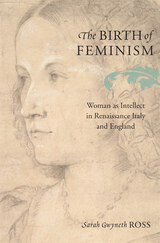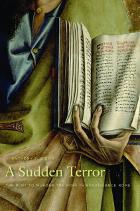
In this illuminating work, surveying 300 years and two nations, Sarah Gwyneth Ross demonstrates how the expanding ranks of learned women in the Renaissance era presented the first significant challenge to the traditional definition of “woman” in the West.
An experiment in collective biography and intellectual history, The Birth of Feminism focuses on nineteen learned women from the middle ranks of society who rose to prominence in the world of Italian and English letters between 1400 and 1680. Drawing both on archival material—wills, letters, and manuscript compositions, some presented here for the first time—and on printed writings, Ross gives us an unprecedented sense of educated early modern women’s lives.
Sponsored and often educated by their learned fathers and other male relatives within a model that Ross terms “the intellectual family,” female authors publicized their works within the safety of family networks. These women, including Christine de Pizan, Laura Cereta, Margaret More Roper, Lucrezia Marinella, and Bathsua Makin, did not argue for women’s political equality, but they represented and often advocated women’s intellectual equality. Ross demonstrates that because of their education, these women had a renaissance during the Renaissance, and that in so doing they laid the foundation for the emancipation of womankind.

In 1468, on the final night of Carnival in Rome, Pope Paul II sat enthroned above the boisterous crowd, when a scuffle caught his eye. His guards had intercepted a mysterious stranger trying urgently to convey a warning—conspirators were lying in wait to slay the pontiff. Twenty humanist intellectuals were quickly arrested, tortured on the rack, and imprisoned in separate cells in the damp dungeon of Castel Sant’Angelo.
Anthony D’Elia offers a compelling, surprising story that reveals a Renaissance world that witnessed the rebirth of interest in the classics, a thriving homoerotic culture, the clash of Christian and pagan values, the contest between republicanism and a papal monarchy, and tensions separating Christian Europeans and Muslim Turks. Using newly discovered sources, he shows why the pope targeted the humanists, who were seen as dangerously pagan in their Epicurean morals and their Platonic beliefs about the soul and insurrectionist in their support of a more democratic Church. Their fascination with Sultan Mehmed II connected them to the Ottoman Turks, enemies of Christendom, and the love of the classical world tied them to recent rebellious attempts to replace papal rule with a republic harking back to the glorious days of Roman antiquity.
From the cosmetic-wearing, parrot-loving pontiff to the Turkish sultan, savage in war but obsessed with Italian culture, D’Elia brings to life a Renaissance world full of pageantry, mayhem, and conspiracy and offers a fresh interpretation of humanism as a dynamic communal movement.
READERS
Browse our collection.
PUBLISHERS
See BiblioVault's publisher services.
STUDENT SERVICES
Files for college accessibility offices.
UChicago Accessibility Resources
home | accessibility | search | about | contact us
BiblioVault ® 2001 - 2024
The University of Chicago Press









